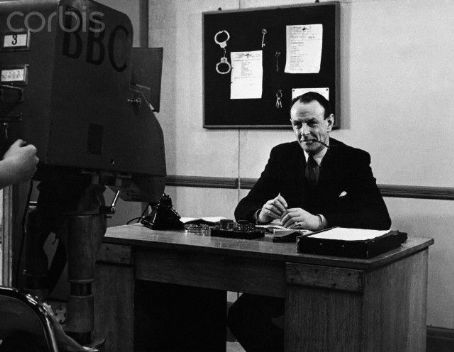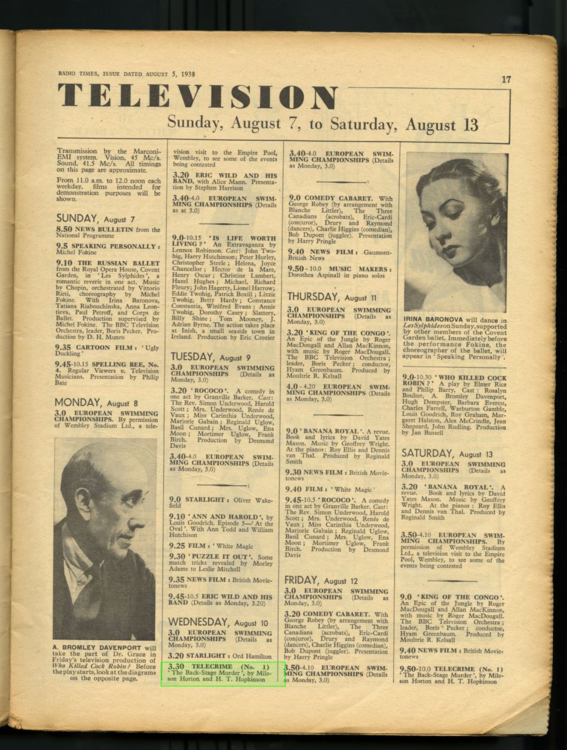Telecrime (lost early BBC crime drama; 1938-1939; 1946): Difference between revisions
(Think I can add a bit more to this one in the future.) |
No edit summary |
||
| Line 5: | Line 5: | ||
|status=<span style="color:red;">'''Lost'''</span> | |status=<span style="color:red;">'''Lost'''</span> | ||
}} | }} | ||
'''''Telecrime''''', is an early BBC whodunit television crime drama. Broadcast from 1938-1939, and in 1946 as '''''Telecrimes''''' following the Second World War, it is listed by Guinness World Records as the first crime show on television.<ref>[https:// | '''''Telecrime''''', is an early BBC whodunit television crime drama. Broadcast from 1938-1939, and in 1946 as '''''Telecrimes''''' following the Second World War, it is listed by Guinness World Records as the first crime show on television.<ref>[https://guinnessworldrecords.com/world-records/first-crime-show-on-tv Guinness World Records, which credits ''Telecrime'' as the first television crime show, and Inspector Holt as the first television detective.] Retrieved 18 Apr '21</ref> | ||
==Plot== | ==Plot== | ||
The episodes consisted of short whodunit crime mysteries lasting 10 to 20 minutes. Television viewers were given enough information to solve the crimes themselves | The episodes consisted of short whodunit crime mysteries lasting 10 to 20 minutes. Television viewers were given enough information to solve the crimes themselves and were challenged to do so before the detective. In the 1938-1939 series, J B Rowe starred as Inspector Holt, noted by Guinness World Records to be the first TV police detective. However, Rowe did not reprise the role for the 1946 series, being replaced by James Raglan as Inspector Cameron. Mileson Horton wrote the majority of episodes, with H.T. Hopkinson helping co-write ''The Back-Stage Murder'', and Arthur Philips being responsible for ''Poetic Justice''. | ||
==Availability== | ==Availability== | ||
Like other early BBC television broadcasts, ''Telecrime'' was broadcast live and were not recorded. Therefore, 22 episodes, five from 1938-1939, and 17 from 1946 | Like other early BBC television broadcasts, ''Telecrime'' was broadcast live and were not recorded. Therefore, 22 episodes, five from 1938-1939, and 17 from 1946 are now permanently missing.<ref>[https://web.archive.org/web/20160312042045/http://www.lostshows.com/default.aspx?programme=01af6d4f-1bd6-42dd-9cf2-84f4df55598f Archived Lost Shows page, listing the missing episodes from 1938-1939.] Retrieved 18 Apr '21</ref><ref>[https://web.archive.org/web/20160309202508/http://www.lostshows.com/default.aspx?programme=506f4f60-b93b-4155-9337-288e029073d7 Archived Lost Shows page, listing the missing episodes from 1946.] Retrieved 18 Apr '21</ref> A photo of J B Rowe as Inspector Holt is all that remains of the show.<ref>[https://famousfix.com/topic/telecrime FamousFix page, which provided the sole photo of ''Telecrime''.] Retrieved 18 Apr '21</ref> | ||
==Gallery== | ==Gallery== | ||
| Line 70: | Line 70: | ||
==External Link== | ==External Link== | ||
*[https:// | *[https://imdb.com/title/tt0261493/ IMDB page for ''Telecrime''.] | ||
==References== | ==References== | ||
Latest revision as of 03:07, 7 July 2022
Telecrime, is an early BBC whodunit television crime drama. Broadcast from 1938-1939, and in 1946 as Telecrimes following the Second World War, it is listed by Guinness World Records as the first crime show on television.[1]
Plot
The episodes consisted of short whodunit crime mysteries lasting 10 to 20 minutes. Television viewers were given enough information to solve the crimes themselves and were challenged to do so before the detective. In the 1938-1939 series, J B Rowe starred as Inspector Holt, noted by Guinness World Records to be the first TV police detective. However, Rowe did not reprise the role for the 1946 series, being replaced by James Raglan as Inspector Cameron. Mileson Horton wrote the majority of episodes, with H.T. Hopkinson helping co-write The Back-Stage Murder, and Arthur Philips being responsible for Poetic Justice.
Availability
Like other early BBC television broadcasts, Telecrime was broadcast live and were not recorded. Therefore, 22 episodes, five from 1938-1939, and 17 from 1946 are now permanently missing.[2][3] A photo of J B Rowe as Inspector Holt is all that remains of the show.[4]
Gallery
See Also
Early BBC Television
- Alexandra Palace's wartime television demonstrations (lost footage of private television transmissions; 1943, 1945)
- An Inspector Calls (lost television adaptation of play; 1948)
- Ann and Harold (lost early BBC drama television series; 1938)
- BBC Election Night (lost coverage of British general elections; 1950-1951)
- The Care of Your Car (lost early BBC motoring show; 1947)
- Cook's Night Out (lost early BBC cooking show; 1937)
- Craftsmen at Work (lost early BBC documentary show; 1938, 1946)
- Dish of the Month (lost early BBC cooking show; 1937)
- First Aid (lost early BBC medical show; 1937)
- Foundations of Cookery (lost early BBC cooking show; 1939)
- Marcel Boulestin television shorts (lost early BBC programs; 1937-1939)
- Masks through the Ages (lost early BBC history talk show; 1937)
- Opening of the BBC Television Service (partially found coverage of inaugural day of high-definition television service; 1936)
- The Orchestra and its Instruments (lost early BBC music talk show; 1937)
- RCA recording of BBC Television Service (found footage of pre-Second World War BBC television broadcast; 1938)
- Sea Stories (lost early BBC talk show; 1936-1937)
- Spelling Bee (lost early BBC game show; 1938)
- The Wasp's Nest (lost early BBC television adaptation of Agatha Christie short story; 1937)
- Weaponless Self-Defence (lost early ju-jitsu television program; 1936-1937)
- The World of Women (lost early BBC talk show; 1937)
Early BBC Sports Television
- 1931 Epsom Derby (lost televised footage of horse racing event; 1931)
- 1937 FA Cup Final (partially found footage of football match; 1937)
- 1937 International Imperial Trophy Race (lost footage of motor race; 1937)
- 1937 Wimbledon Championships (partially found footage of tennis tournament; 1937)
- 1938 Ashes Series (partially found footage of international test cricket match; 1938)
- 1938 FA Cup Final (partially found footage of football match; 1938)
- 1939 FA Cup Final (partially found footage of football match; 1939)
- 1947 FA Cup Final (partially found footage of football match; 1947)
- 1953 British Grand Prix (partially found footage of Formula One race; 1953)
- 1955 Scottish Cup Final (partially found footage of football match; 1955)
- Archery (lost early televised toxophily; 1937-1938)
- Arsenal 7-1 Hibernian (lost footage of charity football match; 1952)
- Arsenal vs Arsenal Reserves (lost footage of early BBC televised football match; 1937)
- Barnet 3-2 Wealdstone (lost footage of Athenian League football match; 1946)
- The Boat Race 1938 (partially found footage of rowing race; 1938)
- Catch-As-Catch-Can Wrestling (lost early BBC televised professional wrestling matches; 1938-1939; 1946-1947)
- Charlton Athletic 1-0 Blackburn Rovers (lost footage of FA Cup match; 1947)
- Darts and Shove Ha'penny (lost early BBC televised darts matches; 1936-1939)
- England 0-1 Scotland (partially found international football match; 1938)
- England 1-1 Scotland (partially found footage of international football match; 1947)
- England 16-21 Scotland (partially found footage of rugby match; 1938)
- England 3-0 France (partially found footage of international football match; 1947)
- England 3-0 Rest of Europe (partially found footage of international football match; 1938)
- Falkirk 3-2 Newcastle United (lost footage of football match; 1953)
- Horace Lindrum vs Willie Smith (lost footage of televised snooker; 1937)
- Scottish Universities 1-1 English Universities (lost footage of international football match; 1952)
- Woods and Jack (lost early televised lawn bowls; 1937; 1946)
External Link
References
- ↑ Guinness World Records, which credits Telecrime as the first television crime show, and Inspector Holt as the first television detective. Retrieved 18 Apr '21
- ↑ Archived Lost Shows page, listing the missing episodes from 1938-1939. Retrieved 18 Apr '21
- ↑ Archived Lost Shows page, listing the missing episodes from 1946. Retrieved 18 Apr '21
- ↑ FamousFix page, which provided the sole photo of Telecrime. Retrieved 18 Apr '21

